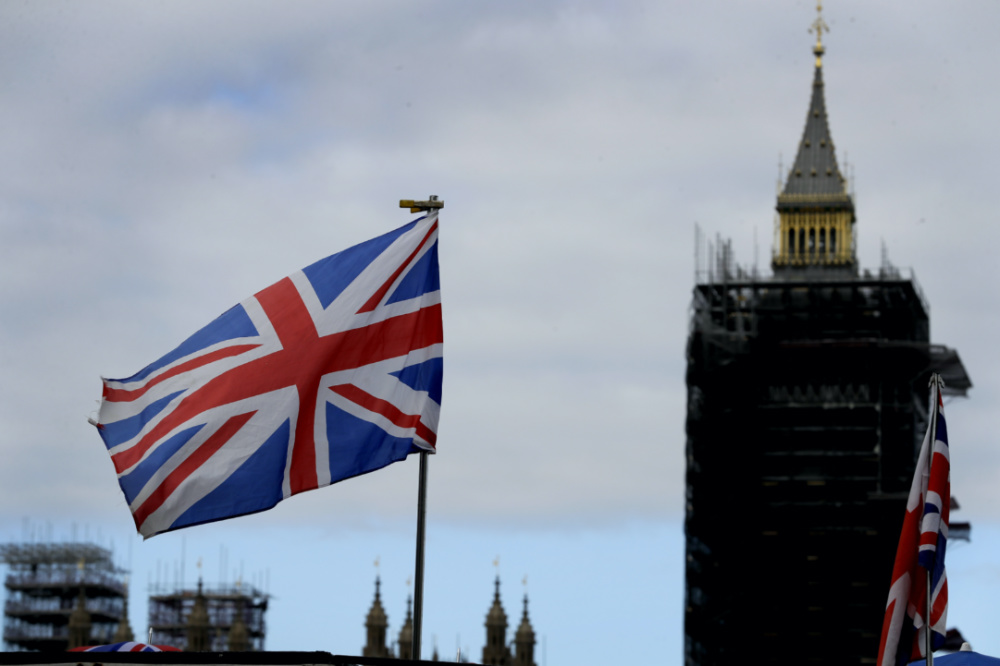London, UK
AP
The UK’s most senior Anglican bishops warned Monday that legislation breaching part of the Brexit divorce agreement the government signed with the European Union will set a “disastrous precedent” and could undermine peace in Northern Ireland.
In a letter published in the Financial Times, the top archbishops in England, Scotland, Wales and Northern Ireland said the government’s Brexit-related Internal Market Bill would give the government power to break international law and had “enormous moral, as well as political and legal, consequences”.

The Union Jack flies above a souvenir stand in front of Big Ben in London, on Friday, 16th October, 2020. PICTURE: AP Photo/Kirsty Wigglesworth.
“We believe this would create a disastrous precedent,” said the letter, signed by Archbishop of Canterbury Justin Welby, who heads the Church of England, and four other archbishops.
“If carefully negotiated terms are not honoured and laws can be ‘legally’ broken, on what foundations does our democracy stand?” they asked.
Meanwhile, Britain and the EU edged toward resuming their troubled trade talks on Monday, after the bloc’s chief negotiator said he was ready to “intensify” negotiations on the legal text of an agreement.
Britain’s chief Brexit minister hailed that as evidence of significant movement from the EU, three days after Prime Minister Boris Johnson declared that the talks were effectively over – a dramatic flourish many believe was intended to inject momentum into the stalled process.
Britain and the EU have been attempting to strike a new trade deal since the UK left the bloc on 31st January.
Those talks ground to a halt last week, with each side calling for the other to compromise in order to secure a deal. The EU said it was happy to keep talking, but Johnson said Friday that negotiations were over unless there was a “fundamental” shift from the bloc. He told British businesses to prepare for a no-deal economic break with the EU at the end of the year.
EU chief negotiator Michel Barnier, who spoke by phone Monday with UK counterpart David Frost, said “the EU remains available to intensify talks in London this week, on all subjects, and based on legal texts”.
“We now wait for the UK’s reaction,” he tweeted.
Michael Gove, the British minister in charge of preparing for Brexit, welcomed Barnier’s statement, which he called a “constructive move.”
But the British Prime Minister’s office said it wasn’t enough to resume talks, which could only happen if the bloc accepted “that movement needs to come from the EU side as well as the UK” Downing St said the two sides would remain “in close touch”.
The Internal Market Bill has been approved by the House of Commons but faces strong opposition in Parliament’s upper chamber, the House of Lords, where the governing Conservative Party does not have a majority.
“The rule of law is a bulwark against authoritarian incursion,” said Igor Judge, a former High Court justice who now sits in the Lords, on the first of several days’ debate on the bill.
“We are about to tear it into tatters.”
If passed, the bill will allow the British Government to override parts of the legally binding Brexit withdrawal agreement relating to trade with Northern Ireland, the only part of the UK to share a border with the EU.
Johnson’s government says it needs the legislation as an insurance policy in case the EU behaves unreasonably after a post-Brexit transition period ends on 31st December and tries to impede the flow of goods between Northern Ireland and the rest of the UK.
The bloc sees it as a flagrant breach of an international treaty that could undermine the delicate foundations of Northern Ireland’s peace settlement, created by the 1998 Good Friday accord.
The bill soured talks aimed at securing a new trade deal between Britain and the EU. While EU and UK negotiators have forged agreement in many areas, negotiations are gridlocked on the issues of fishing – highly symbolic for maritime nations on both sides – and rules to ensure common regulatory standards and fair competition. The EU fears the UK will gain an unfair advantage by slashing food, workplace and environmental standards and pumping state money into businesses once it is free of the bloc’s rules.
Britain accuses the bloc of seeking to impose demands that it has not placed on other countries it has free trade deals with, such as Canada.
If there is no deal, businesses on both sides of the English Channel face tariffs and other obstacles to trade starting on 1st January British business groups warn that could mean border delays, soaring prices and shortages of some goods.
Even with an agreement, British firms will have to fill out customs declarations and other paperwork, because the UK is leaving the bloc’s vast single market.
The British Government launched an ad campaign Monday telling businesses to get ready for the end of decades of seamless trade with the Continent.
But many firms say the government has not supplied the support structures they need, including tens of thousands of customs agents.
“It’s a lot of red tape, and we know that preparations have gone backwards because of the impact of COVID,” said Carolyn Fairbairn, head of the Confederation of British Industry. “So this is deeply challenging for many businesses.”






